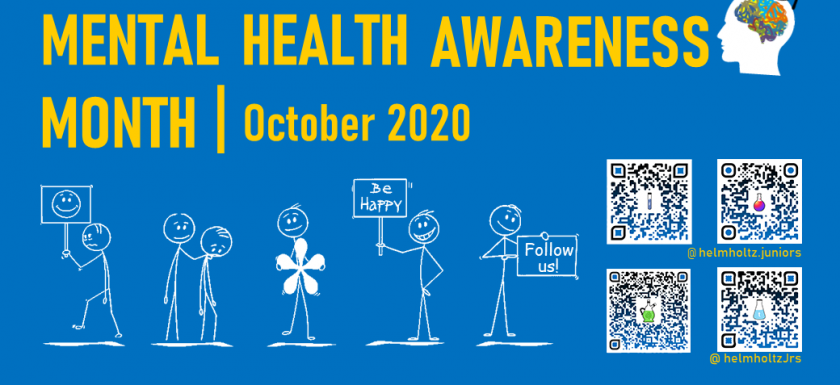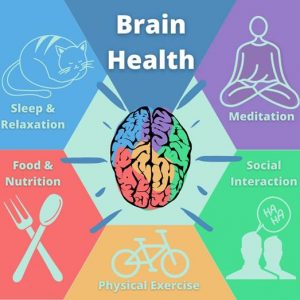
We often talk about heart and lung health, etc. but we seldom talk about brain health which is undeniably central to all our health. The brain is like any other organ. During our Mental Health Awareness month we actually talk a lot about stress. Stress is often portrayed as having only relatively short lasting psychological impacts, but it also alters the biochemistry happening in your body and especially your brain and therefore actually having also long lasting physiological impacts.
So, if you properly take care of it, you will reap the most fulfilling benefits. As the renounced neuroscientist Dr. Daniel Amen [10] said:
When your brain works right, you work right and when your brain is troubled your life is troubled.
So, then the question is how someone can improve one’s brain health? Below are the most important practices, according to a various number of studies, for an ultimately better brain health:
Sleep & Relaxation
Good sleep is the backbone of all brain health [16]. Without good sleep, your brain cannot function. Memory loss, for instance, is often associated with a lack of sleep. When you are sleeping, a structure in the brain called the hippocampus recalls and consolidates recent memories – and without sleep, this natural process is halted [4]. Furthermore, during sleep, the brain gets rid of waste products such as beta-amyloid, which if aggregated to plaques is associated with Alzheimer’s disease [7]. Sleep also improves mood and the immune system and may lead to weight loss [5,6].
Food & Nutrition
 Cells all over your body need to produce ATP – aka the “energy molecule”. During this process, the cells release free radicals. Excess free radicals can lead to oxidative stress and damage of cells – including nerve cells (oxidative stress) [8]. The main factor that increases or decreases the number of free radicals in your blood is food. Healthy food, especially vegetables, which are full of antioxidants like broccoli and spinach, decrease free radicals [13]. Unhealthy food normally contain high amounts of sugars and carbohydrates which can increase the number of free radicals.
Cells all over your body need to produce ATP – aka the “energy molecule”. During this process, the cells release free radicals. Excess free radicals can lead to oxidative stress and damage of cells – including nerve cells (oxidative stress) [8]. The main factor that increases or decreases the number of free radicals in your blood is food. Healthy food, especially vegetables, which are full of antioxidants like broccoli and spinach, decrease free radicals [13]. Unhealthy food normally contain high amounts of sugars and carbohydrates which can increase the number of free radicals.
Healthy food can also improve the necessary chemistry of the brain leading to better cognition. For example, healthy fats like Omega 3 have been shown to improve memory while also being beneficial for the whole body [9].
Physical Exercise
Exercising 20 min a day doing any kind of aerobic activity has shown to have great benefits [12]. It makes the cells of your body much stronger and less prone to oxidative stress. It also improves blood flow to the brain and hence more oxygen and nutrients delivered to the nerve cells. Exercise also stimulates chemical changes in the brain that enhance learning, mood and thinking.
Meditation
Studies show that practicing meditation regularly has great benefits. It helps not only managing stressful situations but also improves memory. In one study it is shown that meditation changes the structure of the brain [2]. It increases the volume of the hippocampus which is responsible for learning and memory and decreases the volume of the amygdala which is responsible for fear and anxiety. If this got you interested and you want to get started with meditation, take a look at these two books [11,15].
Social Interaction
In a shocking study, a group from Harvard medical school reported that feelings of loneliness may have detrimental consequences on cognition, e.g memory loss [3]. Being engaged in social activity is an important pillar of your brain health. Try at least to stay in touch with your family and friends.
Finally, we would like to recommend these two books [10,17], which are full of tips and good practices that boost your brain health.
Your local Helmholtz Juniors
Marlene Härtel , Ivona Kafedjiska
And Doctoral Representatives
Radu Bors, Markus Schleuning, Patrick Schnell, Jennifer Velázquez Rojas, Ke Xu, Ivona Kafedjiska, Marlene Härtel
Follow us and keep up2date with our work!
https://www.helmholtz.de/karriere_talente/wissenschaft/promovierende/helmholtz_juniors/
https://www.facebook.com/helmholtz.juniors/
https://www.instagram.com/helmholtz.juniors/
https://twitter.com/helmholtzjrs/
References
1. https://healthybrains.org/pillars/
2. Hölzel, B. K., Carmody, J., Vangel, M., Congleton, C., Yerramsetti, S. M., Gard, T., & Lazar, S. W. (2011). Mindfulness practice leads to increases in regional brain grey matter density. Psychiatry research: neuroimaging, 191(1), 36-43.
3. Donovan, N. J., Okereke, O. I., Vannini, P., Amariglio, R. E., Rentz, D. M., Marshall, G. A., … & Sperling, R. A. (2016). Association of higher cortical amyloid burden with loneliness in cognitively normal older adults. JAMA Psychiatry, 73(12), 1230-1237.
4. Walker, M. P., & Stickgold, R. (2006). Sleep, memory, and plasticity. Annu. Rev. Psychol., 57, 139-166.
5. Besedovsky, L., Lange, T., & Born, J. (2012). Sleep and immune function. Pflügers Archiv-European Journal of Physiology, 463(1), 121-137.
6. Beccuti, G., & Pannain, S. (2011). Sleep and obesity. Current opinion in clinical nutrition and metabolic care, 14(4),402.
7. Shokri-Kojori, E., Wang, G. J., Wiers, C. E., Demiral, S. B., Guo, M., Kim, S. W., … & Miller, G. (2018). β-Amyloid accumulation in the human brain after one night of sleep deprivation. Proceedings of the National Academy of Sciences, 115(17), 4483-4488
8. Lobo, V., Patil, A., Phatak, A., & Chandra, N. (2010). Free radicals, antioxidants and functional foods: Impact on human health. Pharmacognosy Reviews, 4(8), 118.
9. Amen, D. G., Harris, W. S., Kidd, P. M., Meysami, S., & Raji, C. A. (2017). Quantitative erythrocyte omega-3 EPA plus DHA levels are related to higher regional cerebral blood flow on brain SPECT. Journal of Alzheimer’s Disease, 58(4), 1189-1199
Books
10. The End of Mental Illness by Daniel Amen
11. A New Earth: Awakening to Your Life’s Purpose, by Eckhart Tolle
12. Spark: The Revolutionary New Science of Exercise and the Brain, by John J. Ratey, Eric Hagerman
13. Genius Foods: Become Smarter, Happier, and More Productive While Protecting Your Brain for Life, by Max Lugavere
14. The Brain’s Way of Healing: Remarkable Discoveries and Recoveries from the Frontiers of Neuroplasticity by Norman Doidge
15. Hardwiring Happiness: The New Brain Science of Contentment, Calm, and Confidence by Rick Hanson
16. Why We Sleep: Unlocking the Power of Sleep and Dreams by Matthew Walker
17. The Genius Life: Heal Your Mind, Strengthen Your Body, and Become Extraordinary by Max Lugavere
